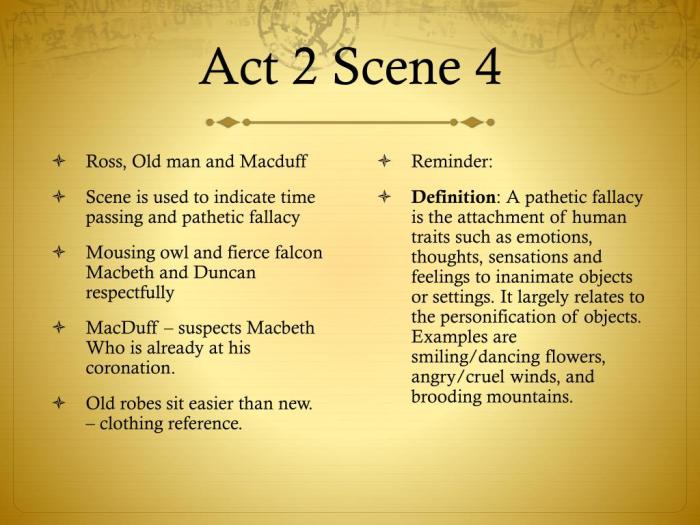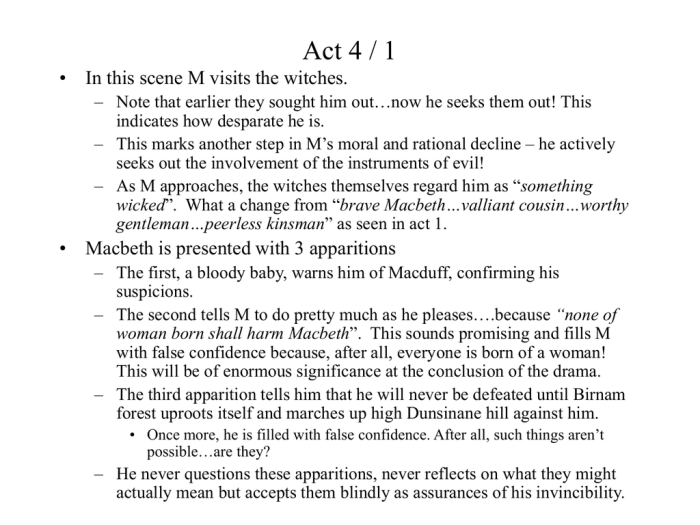Quotes from Macbeth Act 4 transport us into a world of psychological torment, supernatural influences, and unchecked ambition. These powerful words reveal the deteriorating mental state of Macbeth and the transformation of Lady Macbeth, while also shedding light on the play’s central themes and motifs.
Macbeth’s hallucinations and paranoia are evident in his vivid descriptions of seeing a floating dagger and hearing voices. Lady Macbeth’s guilt and remorse manifest in her sleepwalking and the haunting words she utters during her troubled nights.
Macbeth’s Descent into Madness: Quotes From Macbeth Act 4

Macbeth’s mental state unravels in Act 4 as his guilt and paranoia consume him. His quotes reveal a man on the brink of madness, haunted by hallucinations and consumed by delusions of grandeur.
For students looking for a helping hand with their NR 503 final exam, there’s no better resource than the nr 503 final exam answers guide. Meanwhile, for those who seek to delve into the depths of Shakespeare’s Macbeth, Act 4 offers a wealth of memorable quotes that illuminate the play’s themes of ambition, guilt, and the supernatural.
Hallucinations and Paranoia
Macbeth’s hallucinations manifest in his visions of Banquo’s ghost. The ghost’s appearance at the banquet drives Macbeth to a frenzy, revealing his guilt and fear. He becomes paranoid, seeing threats in every corner and suspecting treachery from all sides.
Sleepwalking Scene
The sleepwalking scene in Act 4 is a pivotal moment in Macbeth’s descent into madness. In his delirious state, he confesses his crimes to the doctor, revealing the depths of his guilt and remorse. The scene serves as a chilling reminder of the psychological toll Macbeth’s actions have taken on him.
Lady Macbeth’s Transformation

Lady Macbeth’s character undergoes a significant transformation in Act 4 of the play. Initially portrayed as a ruthless and ambitious woman who manipulates her husband into committing murder, she now appears haunted by guilt and remorse. This shift is evident in her quotes, actions, and motivations.
Her Quotes
Lady Macbeth’s quotes in Act 4 reveal a profound change in her mindset. In earlier acts, she is driven by a thirst for power and a desire to control her husband. However, in Act 4, she expresses regret and guilt over their actions.
For instance, she laments, “All the perfumes of Arabia will not sweeten this little hand.” This quote signifies her growing awareness of the consequences of their crimes and her inability to wash away the guilt.
Her Actions
Lady Macbeth’s actions in Act 4 also reflect her transformation. Unlike her previous boldness, she now appears withdrawn and fearful. She sleepwalks and hallucinates, indicating the psychological toll that the murders have taken on her. Furthermore, she attempts to wash her hands compulsively, a symbolic gesture of her desire to cleanse herself of the bloodstains that haunt her.
Her Motivations
The guilt and remorse that Lady Macbeth experiences in Act 4 have significantly altered her motivations. Previously, she was driven by ambition and a desire for power. However, in Act 4, she is motivated by a need for redemption and forgiveness.
Her actions are no longer driven by a thirst for power but by a desire to atone for her sins.
The Supernatural in Act 4

The supernatural plays a crucial role in Act 4 of Macbeth, intensifying the play’s atmosphere of fear and paranoia. Macbeth’s interactions with supernatural beings, such as the witches and the ghost of Banquo, drive his descent into madness and contribute to the play’s themes of guilt, ambition, and the consequences of evil.
The Witches’ Prophecies, Quotes from macbeth act 4
The witches’ prophecies continue to haunt Macbeth in Act 4. His encounter with the apparitions, which reveal that he must beware Macduff and that he will not be defeated until Birnam Wood comes to Dunsinane, further intensifies his fear and insecurity.
These prophecies serve as a constant reminder of his guilt and the inevitability of his downfall.
The Ghost of Banquo
The ghost of Banquo’s appearance at the banquet is a powerful symbol of Macbeth’s guilt and the consequences of his actions. The ghost’s presence unsettles Macbeth, causing him to hallucinate and behave erratically. The ghost’s appearance serves as a reminder of Macbeth’s crime and the fact that he cannot escape the consequences of his actions.
The Supernatural and the Play’s Atmosphere
The supernatural elements in Act 4 contribute to the play’s eerie and suspenseful atmosphere. The witches’ prophecies, the ghost of Banquo, and Macbeth’s hallucinations create a sense of unease and dread. These elements heighten the tension and make the audience question the nature of reality and the boundaries between the natural and supernatural worlds.
The Symbolism of Sleep and Dreams

Sleep and dreams play a pivotal role in Macbeth’s descent into madness in Act 4. These elements symbolize the characters’ inner turmoil and the consequences of their actions.
The “Dagger of the Mind”
Macbeth’s hallucination of a dagger floating before him represents his guilt and fear. The “dagger of the mind” symbolizes the internal struggle he faces as he grapples with the consequences of his crimes.
Sleepless Nights
Macbeth and Lady Macbeth both suffer from sleepless nights. This insomnia reflects their inability to escape their guilt and the horrors they have committed. Their sleepless nights become a symbol of their tormented minds.
The Themes of Ambition and Power

Act 4 of Macbeth delves into the corrosive effects of unchecked ambition and the corrupting influence of power. Macbeth’s descent into madness is paralleled by his wife’s transformation, highlighting the devastating consequences of their relentless pursuit of power.
Macbeth’s Descent into Madness
Macbeth’s ambition, once driven by a desire for greatness, has now spiraled into an obsession that consumes his sanity. His hallucinations and paranoia reveal the toll that his unchecked ambition has taken on his mind.
“Sleep no more! Macbeth does murder sleep… Sleep that knits up the raveled sleave of care, The death of each day’s life, sore labor’s bath, Balm of hurt minds, great nature’s second course, Chief nourisher in life’s feast—”
Macbeth’s guilt and fear have robbed him of the ability to rest, a symbol of his lost peace of mind. The imagery of sleep as a “death” and a “balm” highlights the destructive nature of his ambition, which has turned his life into a living nightmare.
Lady Macbeth’s Transformation
Lady Macbeth, once a ruthless and ambitious partner in crime, has undergone a profound transformation. The guilt and remorse that once haunted her have now consumed her, leading to her sleepwalking and mental breakdown.
“Out, damned spot! Out, I say!—One, two: why, then ’tis time to do’t. Hell is murky! Fie, my lord, fie! a soldier, and afeard? What need we fear who knows it, when none can call our power to account?”
Lady Macbeth’s obsessive attempts to wash away the metaphorical “spot” of guilt reveal the extent to which her conscience has been shattered. Her descent into madness is a testament to the corrupting influence of power and the fragility of the human psyche.
FAQ Overview
What is the significance of the sleepwalking scene in Act 4?
The sleepwalking scene reveals Lady Macbeth’s guilt and remorse over her role in Duncan’s murder. It also foreshadows her eventual madness and death.
How do the witches’ prophecies contribute to the atmosphere of Act 4?
The witches’ prophecies create a sense of suspense and foreboding, hinting at the tragic events that are to come. They also add an element of the supernatural to the play.
